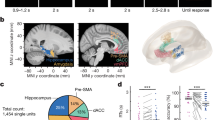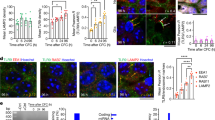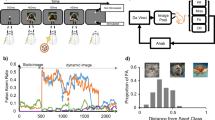Abstract
THERE are reasons to believe that memory storage, particularly “long-term” memory storage, is mediated by the synthesis of protein which facilitates synaptic connexions1. We have recently reported studies which show that cerebral protein synthesis may be necessary for “long-term” memory but not for learning or “short-term” memory2. In these studies mice whose cerebral protein synthesis at the time of training had been inhibited about 95 per cent by intracerebral injections of acetoxycycloheximide were found to learn a left–right discrimination in a T maze normally, to remember normally 3 h after training, but to have marked impairment of memory 6 h or more after training. The effect of acetoxycycloheximide on memory 6 h or more after training (“long-term” memory) was marked when training was continued until the mice made three out of four consecutive correct responses, but was not significant when training was continued until the mice made nine out of ten consecutive correct responses. We concluded from these findings that the small amount of intact protein synthesizing capacity might be sufficient to mediate storage of memory if repeated training of a very simple task was given. It therefore seemed worthwhile to determine the effects of acetoxycycloheximide on learning and memory of a more difficult task. This report describes the effects of this drug on learning and memory of a light–dark discrimination in a T maze. We found, as in our studies with the left–right discrimination, that acetoxycycloheximide had no effect on learning or on memory of the correct solution for 3 h after learning, but it did impair memory 6 h or more after learning. With this task the effect of acetoxycycloheximide was striking even when training was continued to a criterion of nine out of ten consecutive correct responses.
This is a preview of subscription content, access via your institution
Access options
Subscribe to this journal
Receive 51 print issues and online access
$199.00 per year
only $3.90 per issue
Buy this article
- Purchase on Springer Link
- Instant access to full article PDF
Prices may be subject to local taxes which are calculated during checkout
Similar content being viewed by others
References
Barondes, S. H., Nature, 205, 18 (1965).
Barondes, S. H., and Cohen, H. D., Proc. US Nat. Acad. Sci., 58, 157 (1967).
Author information
Authors and Affiliations
Rights and permissions
About this article
Cite this article
COHEN, H., BARONDES, S. Effect of Acetoxycycloheximide on Learning and Memory of a Light–Dark Discrimination. Nature 218, 271–273 (1968). https://doi.org/10.1038/218271a0
Received:
Revised:
Issue Date:
DOI: https://doi.org/10.1038/218271a0
This article is cited by
-
Role of RNA and protein in memory storage: A review
Behavior Genetics (1974)
-
The biochemical and pharmacological basis of learning and memory
Agents and Actions (1971)
-
Actinomycin-D: Effects on Memory at Different Times after Training
Nature (1970)
-
A parallel study of the amnesic effects of cycloheximide and ECS under different strengths of conditioning
Psychopharmacologia (1970)
-
Zur Biochemie des Ged�chtnisses
Die Naturwissenschaften (1970)
Comments
By submitting a comment you agree to abide by our Terms and Community Guidelines. If you find something abusive or that does not comply with our terms or guidelines please flag it as inappropriate.



